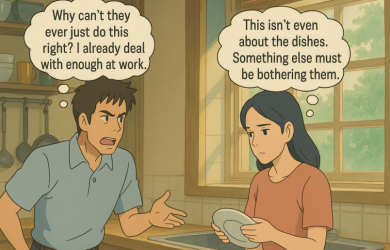10 Ways to Promote Healthy Anger Management for Kids

Unlock Daily 30-Sec Tips for a Happier Relationship
👉 Subscribe FREEKey Takeaways
Marriage.com AI Quick Summary
There are some lucky parents who don’t worry about their child’s behavior and how they might be growing up. But most parents spend their time trying to understand whether their child is growing up in the best environment that is healthy for them.
Now, if a child has violent outbursts frequently, that can alert the parent’s about something that might be wrong. They might start looking for ways to facilitate anger management for kids.
Anger management for children can help all kids, but it can be a crucial requirement for a child who is finding it difficult to handle their emotional outbursts. These kids may end up screaming, throwing things, or, at times, becoming physically violent.
Kids anger management strategies are specially aimed at helping children understand their emotions, assessing the impact of their outbursts, and finding healthier ways to process their emotions.
Read this article to learn why anger management for kids might be required and how you can facilitate healthier emotional aspects of their life.
5 underlying causes for anger issues in kids
Have you been wondering, “Why is my child so angry and aggressive?” Has your child’s angry outbursts made you worry about their future?
There can be various reasons why your child might need anger management for kids, some of which we have listed here:
1. Family environment
Anger management techniques for kids can be crucial, especially when the child is living amidst an unhealthy environment at home. Research shows the significant impact the home can have on a child’s emotional, cognitive, and social development.
You may have to see anger management for kids if the child is witnessing a lot of angry adults around them or if they feel like no one is listening to them.
2. Trauma
A child’s anger management may become an area of concern if they have experienced some trauma that has made them emotionally unstable and unhealthy. Research shows that unresolved trauma can lead to deep-rooted anger in individuals, which often leads to outbursts.
3. Learning disability
Studies have shown that children who have learning disabilities may often feel dejected and frustrated over their inability to learn things at the same pace as others. This frustration can sometimes lead to unhealthy anger management in kids.
4. Developmental changes
Anger management skills for kids might be required during a specific period of a child’s growth. They may be going through various physical, hormonal, and emotional changes that they might find difficult to understand or handle calmly.
5. Mental health conditions
If a child is dealing with depression, anxiety, attachment issues, ADHD, or any other mental conditions, they might take out their frustration in the form of anger. This is when anger management strategies for kids can become useful.
10 tips to help your child manage their anger
Anger management for kids can be a powerful tool that can help them not only in the present but also give them a strong foundation for their future.
By learning how to teach a child to control their anger, you can make sure that your child has all the necessary tools to handle their emotions in a more effective way.
Here are some ways to facilitate managing anger for kids:
1. Encourage discussions about the anger
The first way to ensure anger management for kids is to have honest and open discussions about how your child is feeling and then explore with them the possible reasons behind this.
Try to create a safe environment where your child feels comfortable and does not fear being judged. This can lead to honest conversations that help them get to the root of the problem rather than leaving things unresolved.
2. Establish boundaries
Different families have different rules regarding what behavior is acceptable and what isn’t when it comes to anger. Some parents do not mind voices being raised or doors being slammed, while others do not tolerate such behavior.
Write down rules that mirror your expectations. Stress upon respectful behavior towards others at all times.
Address issues like name-calling, destruction of property, and physical aggression so that your child knows that such behavior is not permissible when they are mad.
3. Lead with example
A big part of anger management for kids involves portraying the correct behavior in front of your children. Children pick up on the behavior of the adults around them, and the wrong example of angry outbursts can act as permission for the child to act similarly.
Make sure that you process your anger in healthy ways, especially around your children, as they will pick on these cues and likely embody them in their behavior.
4. Help identify their triggers
Research shows that anger usually has triggers in everyday life that set a person off. Analyzing an outburst of anger with your child can help them see what is making them react this way and explore why this happens.
Healthy ways for a child to express anger can help them deal with the triggers of their anger in a balanced and informed manner.
5. Motivate with consequences
Motivate your child with positive consequences when he upholds the anger rules, such as the token economy or reward system, and apply negative consequences when he breaks them. These may include loss of privileges or time out.
6. Channelizing anger
Kids require skills to manage their anger. Anger management for kids becomes easy when you make a list with your child of constructive ways to handle emotion. Some anger management activities for kids are as follows:
- Go to a quiet place
- Breathing exercises. Ask your child to deeply breathe in through his nose while you count to four and then breathe out from the mouth while you count to eight
- Put on some music and dance
- Watch a favorite movie
- Play a board game
- Make a drawing or color in a coloring book
- Move to another room away from the trouble
You can also try some anger management worksheets for kids. These worksheets help people understand their behavioral and physical responses to anger.
7. Encourage a healthy lifestyle
Some kids find it hard to manage their anger at all times. Make sure that your child is sleeping well, eating sufficiently, and is not under any undue pressure to excel in school. Your help and guidance will definitely help him develop better-coping skills for anger.
8. Don’t take it personally
While you are in the midst of encouraging activities for anger management for youth, remember not to take your child’s actions or words personally. Their anger issues might make them react in ways that are a reflection of their feelings towards the situation or themselves and not towards you.
9. Be patient
Another important tip to remember is that you have to be patient with your child while they go through the children’s anger management steps. Change in their behavior will not happen overnight, and you have to allow them some time to make changes in their behavior.
Watch this video to learn to key to calm and patient parenting:
10. Consult an expert
If your child is still having angry outbursts, you can consult an expert for coping strategies for anger for kids. They can properly assess the issues that your child might be facing and teach them how to handle their feelings in a more healthy manner.
You can take them to a child psychologist, which is different from couples therapy, where the expert can address their issues one-on-one.
Final thoughts
Children are affected by the environment they live in, and oftentimes, their childhood experiences and habits can live with them forever. So, try to implement certain corrective actions that ensure that your child deals with anger in a healthy manner.
 Tips
Tips
Write your tip or submit a video tip
All tips are reviewed before the publishing.
Share this article on
Want to have a happier, healthier marriage?
If you feel disconnected or frustrated about the state of your marriage but want to avoid separation and/or divorce, the marriage.com course meant for married couples is an excellent resource to help you overcome the most challenging aspects of being married.
Recent Articles
Related Quizzes
Unlock Daily 30-Sec Tips for a Happier, Healthier Relationship
👉 Subscribe FREE on YouTube We'd love your feedback!
We'd love your feedback!
 Expert Q&A
Expert Q&A
Ask your question related to this topic & get the support you deserve from experts.



















 Thanks for your feedback!
Thanks for your feedback!